Tue 1 Jul 2014
A Movie Review by Jonathan Lewis: FIRE OVER ENGLAND
Posted by Steve under Films: Drama/Romance , Reviews[13] Comments
FIRE OVER ENGLAND. United Artists, UK/US, 1937. Flora Robson, Raymond Massey, Leslie Banks, Laurence Olivier, Vivien Leigh, Lyn Harding, Robert Newton. Based on a novel by A. E. W. Mason. Director: William K. Howard.
Fire Over England is an historical drama set in the late 1580s. Based on a novel of the same name by A. E. W. Mason, the movie takes place during the reign of Queen Elizabeth as the Anglo-Spanish War (1585-1604) rages on.
The film has a captivating plot, very good cinematography by James Wong Howe that makes excellent use of shadow and lighting, and a memorable soundtrack. It manages to pack quite a bit of action in 92 minutes. While there aren’t any truly outstanding moments in the film, it’s overall a well-executed project. The maritime fight scenes, in particular, are extremely watchable.
We begin in the Court of Queen Elizabeth (Flora Robson). A frantic Cynthia, portrayed by Vivien Leigh in what was to be her first on screen performance with future husband Olivier, is fluttering about. Then we hear the film’s first voice. It’s that of James Mason, in an uncredited role as Hillary Vane, a distinctively bearded Englishman who we soon learn is traitor and an agent for King Philip II of Spain.
Soon after, we encounter Michael Ingolby (Olivier), a patriotic, if somewhat youthful Englishman. He and his father, Sir Richard Ingolby (Lyn Harding), are traveling on an English vessel that is captured by the Spanish. Michael escapes and swims ashore. His father isn’t so lucky. Sir Richard Ingolby is captured and burned to death at the Inquisition in Lisbon. The younger Ingolby witnesses the smoke over Lisbon, learns that his father died there, and develops a hatred of Spain.
But then it gets complicated, for he has developed feelings for Elena (Tamara Desni), a Spanish girl who saved him following his escape. Even so, Ingolby returns to England. There, he woos his beautiful fiancée, Cynthia (Leigh), and metaphorically butts heads with the Queen. His wit and daring impresses the publicly fierce, but privately fragile, monarch as to his true abilities and his loyalty. Soon, Ingolby assumes the now dead traitor Vane’s identity and returns to Spain to act as a spy in the palace of King Philip II (Raymond Massey, below and to the right).
After a series of twists and turns and an coincidental but inevitable encounter with Elena and her now husband Don Pedro (Robert Newton), Ingolby makes his way back once again to his island homeland. Once there, he leads men in battle against the encroaching Spanish Armada. When it’s all over, it’s the burning of the Armada that in the end creates flames all over England. (In an earlier entreaty to the Queen, an impassioned Ingolby had warned of the Spanish menace and how, if the English did not act soon, the Spaniards would rain fire down on England.)
With a cast such as this, it’s no surprise that the film benefits from its above average to superb acting, much of it quite theatrical. Olivier was around thirty years old when Fire Over England was made and his talent is on display throughout the film. Leigh’s work in the film led directly to her being cast as Scarlett O’Hara in Gone With The Wind.
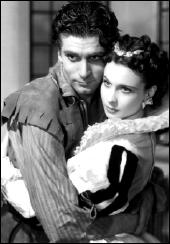
Although their onscreen pairing would culminate in real life marriage, the chemistry between Olivier and Leigh, while definitely palpable, just doesn’t come across as strong as that between Olivier and Desni. Perhaps that is the case because there was far more tension between Olivier and Desni’s characters than between Olivier and Leigh’s.
For his part, Raymond Massey is perfectly fine in his portrayal of the rather taciturn Philip II. His is just not a particularly memorable performance. Flora Robson’s portrayal as Queen Elizabeth, however, really is quite remarkable. One just imagines that Queen Elizabeth would have come across quite similar to how Robson portrays her in this film.
Released in 1937, Fire Over England does seem to make implicit allusions to England’s contemporaneous concerns over the rise of Nazi Germany. Spain is presented not just as a great power rival, but as a totalitarian force that threatens English liberty. It’s somewhat ironic then, that in film with such strong pro-English sentiment, that the characters with the most depth to them are the Spaniards, Elena and Don Pedro, both of whom are faced with far more difficult moral choices than any other characters in the film.
In conclusion, Fire Over England is a well above average movie and one that anyone with an interest in early British cinema, in particular, should seek out. (The film is in the public domain, so there are likely copies of varying quality available.)
While it may not be among the best historical epics ever produced, it’s still a very good film, one that showcases the talents of two actors who would go on to even bigger and better projects, both in the movies and in their personal lives.
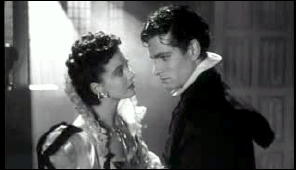
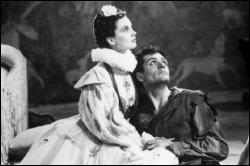
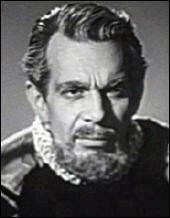
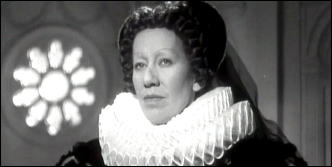
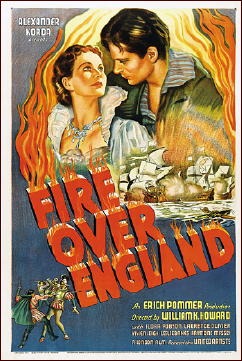
July 1st, 2014 at 9:56 pm
A fine summary of this excellent film. Flora Robson defined Queen Elizabeth a second time, in The Sea Hawk, made by Warners with Errol Flynn starred and the Spanish bad guys, once again. Well, that is the way history reads. They do a good job standing in for The Germans.
July 1st, 2014 at 11:46 pm
Robson’s pre Armada speech is the films acting highlight and clearly aimed at the contemporary political situation.
Very good summary of the films charms, though I might be a little more effusive about the fire boat sequence. But for a relatively low budget swashbuckler this is quite good. Though to be fair British Channel weather destroyed the Armada as much as British fireboats and Drake’s Navy.
There are some interesting ironies re author Mason. Around the time he penned this he was probably England’s top secret agent; this one of only a handful of Secret Service themed books (The Four Feathers and one contemporary short)but he was more than qualified to write them.
Ironically his finest achievement as an agent was establishing the Spanish Network, a triumph of its type that lasted through two world wars, a civil war, and into the 1970’s. His most novelistic job was during the first war when he buried anthrax infected mules(and a few Germans) the Germans were smuggling into France under an avalanche in a pass in the mountains between France and Spain.
He worked in Admiralty Intelligence under the famous Admiral ‘Needles’ Hall, the man largely responsible for breaking the Zimmerman telegram code. All in all it gives the spy sequences in Spain an extra cachet in the film.
There are more details in Roger Lancelyn Green’s biography and Richard Deacon’s History of the British Secret Service.
And Sherlock Holmes fans may note the Lyn Harding in the credits was a highly successful Moriarity to Arthur Wotner and Clive Brooks, and probably the actor most identified with the role and who played it the most often on screen.
July 2nd, 2014 at 12:35 am
It was interesting for me to see how Spain was presented as a totalitarian power rather than as a great power rival. Clearly, a nod to the situation with Nazi Germany. One can also see the parallels drawn between the Inquisition and Nazism. Although, in 1936-37, no one really had any idea how bad it was going to get with the Nazis.
Maybe I went a bit overboard (pun intended) in my praise for the maritime fight scenes, but I quite enjoyed them. The version on YouTube (see above) actually is a bit crisper than the version I watched on DVD anthology set of Vivien Leigh films.
Considering the film was from the late 1930s, I think James Wong Howe did an exceptional job at capturing fire at night on film.
Thanks for the information about Mason. Seems like someone I’d like to learn more about. When I was in graduate school, I did quite a bit of research on Franco’s Spain and Salazar’s Portugal. There’s a lot of interesting material there for future novelists and writers.
July 2nd, 2014 at 9:25 am
Jonathan —
In 1936 – ’37 many people had a better than good idea about how bad The German was situation was, and in fact, before that date. Intervention could have taken place prior to 1939=1941 but did not have the attention of political elites in England — and this film is addressed to the Neville Chamberlain brigade — or in the United States. Feckless leadership lead to death, torture and destruction, of almost all concerned.
July 2nd, 2014 at 2:53 pm
The period between the wars was characterised by a mixture of cynicism and wishful thinking. There seems to have been a feeling that if a second world war took place, it would spell the end of civilisation (take a look at the movie version of H G Wells THINGS TO COME for an idea of what people thought it would be like).
Hitler flourished because Chamberlain genuinely thought that it was both possible and necessary to prevent possible armageddon by appeasing Hitler. There was also a feeling in certain quarters that a strong right wing government in Germany might act as a bulwark against the spread of Russian style communism. At the time, Winston Churchill was looked on as a dangerous warmonger by a large part of the political elite. It’s obvious now that Churchill was absolutely correct, but hindsight tends to make a lot of things much clearer.
Reading the Mason book some years ago, I was surprised how little of it was retained in the script. It’s a long time ago, but I remember thinking that you could do a remake based on the novel that would bear little resemblance to the original film. That said, I really do enjoy the film.
David: A great deal of the Armada was destroyed by bad weather, but to be fair during the Battle of Gravelines the British fleet were able to inflict terrible damage to the Spanish Fleet with very little damage to their own ships. Once it became obvious that the quicker moving British fleet could see off the more cumbersome Spanish ships, the invasion was already defeated, and the Spanish could do nothing but head back home. It was at this point that the terrible storms really did damage to the Spanish Fleet. I suspect the fact that God himself seemed to have turned against them was as devastating a pschological assault as the result of the actual battles.
July 2nd, 2014 at 3:09 pm
I’m a huge Anglophile and would never knock the British Navy, obviously they sailed rings around the Spanish and French, their smaller faster ships and natural born sailors a tremendous advantage. Aside from Drake, at least three of the greatest British admirals in history stood against the Armada, and demonstrated a grasp of tactics that eliminated any advantage the Spanish had in numbers and ship size.
Even then the fireships were the most devastating of Drake’s weapons.
The storms assured that there was no fleet to rebuild though. Without them Spain might have considered trying again. The storm, like Japan’s Divine Wind against Kubla Khan’s navy, was a remarkable piece of luck, although bad weather in the Channel has never been unusual. It was an unusually bad storm though for anytime of year.
The surviving Spanish sailors who made it to the shores of Ireland, were the basis for today’s Black Irish.
July 2nd, 2014 at 3:20 pm
Churchill was not the only individual, statesman or private citizen, who saw the truth. Nothing at all to do with hindsight but with a kind of religious fervor only felt now with the words of those who want to save ‘the planet’. Weakness and capitulation always end badly for the weak. Disarmament is a failed concept along with peace in our time. You know ‘there are some things a man can’t ride around.” (The Tall T)
July 2nd, 2014 at 3:40 pm
It is one of those battles which have a huge influence on the psyche of a country. Not really a surprise that they decided to evoke the spirit of those times in reference to the then current crisis. I suspect that someone who didn’t know when it was made would think that it was made either just before or during the war, as there is no real attempt to hide the movies political sensibilities.
As regards those sailors who made it to Ireland, I once met someone from County Clare who told me that there are still local legends that the beach is haunted by the ghosts of Spanish Sailors.
July 2nd, 2014 at 9:05 pm
Bradstreet:
Just a word about Neville Chamberlains beliefs genuine or otherwise. He lead a great nation and got it wrong. As far as what one of these so-called statesmen actually believe, and while I don’t care about anything other than insight and result, it seems clear that neither Hitler, nor Stalin, thought of himself as malicious — a term that hardly scratches the surface.
And there were many Germans who got it right and fled the country. Others, too weak or stupid remained. And endured the consequences.
July 3rd, 2014 at 1:32 am
I remember reading one of his surviving colleagues talking to an interviewer back in the early 80s. He claimed that “As a Prime Minister, Neville made a good Lord Mayor of Birmingham…”
Probably no one, however evil they be, actually thinks of themself as evil. Hitler seems to have been a humourless bully; a tenth rate mind who unfortunately had an enormous dollop of charisma. He attracted people similar to himself, but I understand that during the war the Allies debated whether or not to kill Hitler. It was finally decided that, in the long run, it was more damaging to the long term German war effort to keep him in power.
Stalin was an example of what happens when you put a psychopath in charge of a country.
July 3rd, 2014 at 1:46 pm
Clearly, there are implicit allusions to Nazi Germany in this film.
But a contemporaneous British audience would have also been aware of the ongoing Spanish Civil War and the rising tide of pro-fascist and reactionary forces there. Nazi Germany sent military forces to aid Franco beginning in July 1936.
July 3rd, 2014 at 2:40 pm
This is complicated, Jonathan. Franco’s Spain, of course, remained strictly neutral during the course of war. Burt Boyar wrote a fascinating book about this time and credited the Franco regime, and him personally, with saving tens of thousands of Jews. And, I add personally, lots of good people are not leftist.
July 3rd, 2014 at 5:45 pm
Burt’s book, Hitler Stopped By Franco is available on Amazon in both paper and kindle formats.